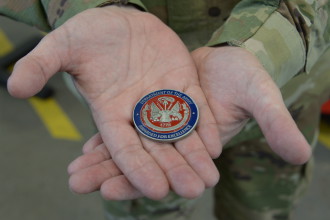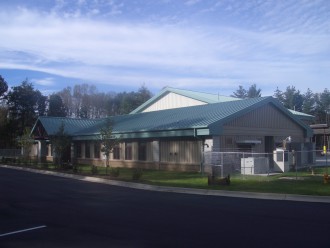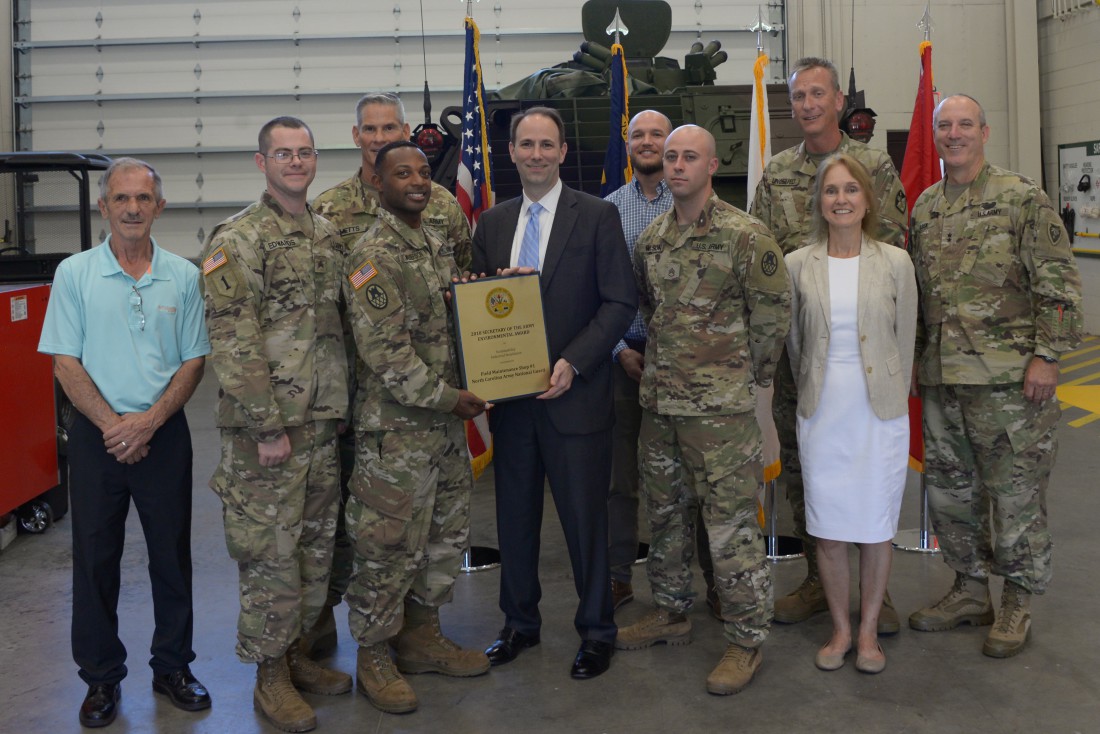Life in the armed forces has always been a matter of discipline — “willingly doing what is right,” in the words of the U.S. Army. But in the modern military, according to 1st Sgt. Todd Lingerfelt of the N.C. National Guard’s Field Maintenance Station No. 1 in Asheville, that commitment includes doing right by the planet.
“We promote environmental standards even for soldiers in basic training,” Lingerfelt says. “If, for instance, we go in and leave boot prints in the mud, we might have engineers come in after us and make sure that we leave no tracks behind.”
Lingerfelt’s station has drawn national praise for enthusiastically embracing the environmental ethos. On Aug. 3, Jordan Gillis, acting assistant secretary of the Army for installations, energy and environment, presented FMS No. 1 with the Secretary of the Army Environmental Award, given annually to just nine individuals, teams or installations from Army operations across the country.
Gillis commended the station, which maintains and rehabilitates over 900 vehicles, weapons systems and pieces of communications equipment for Guard members, for its work to prevent pollution and increase sustainability. Through its programs to “reduce, reuse and recycle,” he said, FMS No. 1 staff members had set a strong example for their comrades throughout the armed forces.
“I’m extremely proud of FMS No. 1 and the N.C. Army National Guardsmen, soldiers and civilians alike, who have taken an active role in environmental stewardship getting you where you are now, reducing our blueprint in the environment,” Gillis said during the award ceremony at the station. “Your efforts today position the Army to do great things from 2025 and beyond. I applaud your dedication, all your efforts and hard work.”
A tight ship

Environmental consciousness takes on added importance at FMS No. 1 given the shop’s location on Minuteman Road northwest of downtown Asheville, close to the French Broad River. The station and its personnel must not only be cognizant of the impact any spills or contamination would have on the area, but also must adhere to federal and local regulations overseeing its operation.
“Our efforts must be part of the operational battle rhythm to meet regulatory expectations,” Lingerfelt explains. “To meet these guidelines, we must be ever-vigilant to ensure we comply.”
Three of the station’s nine staff members oversee a strict regimen of day-to-day compliance and quality assurance. Routines include weekly tracking and monitoring of hazardous materials, weekly “clean sweeps” to look for and correct any vehicle leaks and monthly inventories of hazardous and waste materials — the records for which are stored electronically, eliminating the need for paper copies.
FMS No. 1’s focus on vehicle maintenance leads staff to be particularly careful with petroleum products and antifreeze, which could be harmful if spilled. For example, the station’s on-site antifreeze recycling system connects directly to vehicles and extracts, cleans and reinjects the coolant in a closed loop. This approach both reduces the risk of potential spills and keeps staff from performing unnecessary maintenance.
For fueling those vehicles, the facility uses an overhead pneumatic pump system to transport petroleum between storage tanks and maintenance bays. That direct delivery, combined with double-walled storage containers, provides extra layers of prevention against spillage. The station also contracts with a vendor to collect, transport and recycle used motor oil, approximately 1,200 gallons per year since 2008.
Numbers game

The shop’s volume of activity means that its environmental efforts add up to impressive impacts. Beyond oil and antifreeze, FMS No. 1 also recycles plastic, metal, paper, cardboard, batteries and wood pallets: Altogether, those waste streams total over 39,000 pounds of material kept out of landfills annually.
Scrap metal is the biggest contributor to that amount, with over 7,000 pounds sent for recycling each year, including aerosol spray cans that are punctured and then crushed for recycling. Other top recycled materials include more than 5,000 pounds of tires and roughly 3,800 pounds of paper.
Lingerfelt adds that the shop has replaced nearly 10,000 pounds of lead-acid batteries with gel cells for both practical and environmental reasons. Although gel cells are a bit more expensive, they are sealed to prevent acid leaks, hold a charge for longer periods of time and can last almost indefinitely if recharged every six months — perfect for the National Guard, where vehicles may only get used once a month or for three weeks during a year.
Other aspects of the shop’s efforts focus on reducing its needs. Working with Duke Energy, staff is switching all of FMS No. 1’s light fixtures to energy-saving LED bulbs, which will slash the shop’s energy use by 50.4 percent. At more than 12,540 mWh, that reduction is the equivalent of not running 10 window air-conditioning units every day for a year.
The project is also calculated to eliminate 15,383 pounds of carbon dioxide, 301 pounds of lead compounds, 214 pounds of mercury compounds, 75 pounds of sulfur dioxide and 13 pounds of nitrogen oxides from the shop’s annual greenhouse gas emissions. Such totals have a similar impact as cutting 20,000 vehicle miles.
Even the shop’s towel program has come under environmental scrutiny. FMS No. 1 collects, stores and cleans all of its towels instead of using disposable ones. While the contract for cleaning those towels accommodates up to 800 towels, the shop has dropped its usage from 315 per month in 2015 to approximately 90 per month last year.
Taking it outside
Lingerfelt is proud of his shop’s environmental edge over other facilities throughout the armed services. To win the Secretary of the Army Environmental Award, he says, FMS No. 1 first bested 14 other stations across North Carolina, then competed at the national level. The shop also came in second in the 2018 Secretary of Defense Environmental Awards, which include entries from around the world, in the category of Sustainability, Industrial Installation.
But collaboration is even more important to the shop’s mission. FMS No. 1 works in conjunction with other governmental agencies, such as Buncombe County’s Department of Emergency Services, to conduct spill training exercises. Staff members also regularly host facility environmental training for civilian contractors and military personnel, Lingerfelt says.
Within the National Guard, the shop often sets precedent for other facilities. After FMS No. 1 instituted its on-site antifreeze recycling system, for example, the force’s state environmental manager purchased recycling machines for use at other maintenance shops throughout North Carolina.
“Truly, any accolades we receive are shared throughout the organization as we strive to exceed regulatory expectations,” Lingerfelt says. “The recognition is acknowledged as a ‘job well-done,’ and this pursuit is ingrained in each of us as we strive for excellence. We are pleased that our efforts can be recognized and hope to share our management philosophies to enhance the organization as a whole.”



Before you comment
The comments section is here to provide a platform for civil dialogue on the issues we face together as a local community. Xpress is committed to offering this platform for all voices, but when the tone of the discussion gets nasty or strays off topic, we believe many people choose not to participate. Xpress editors are determined to moderate comments to ensure a constructive interchange is maintained. All comments judged not to be in keeping with the spirit of civil discourse will be removed and repeat violators will be banned. See here for our terms of service. Thank you for being part of this effort to promote respectful discussion.